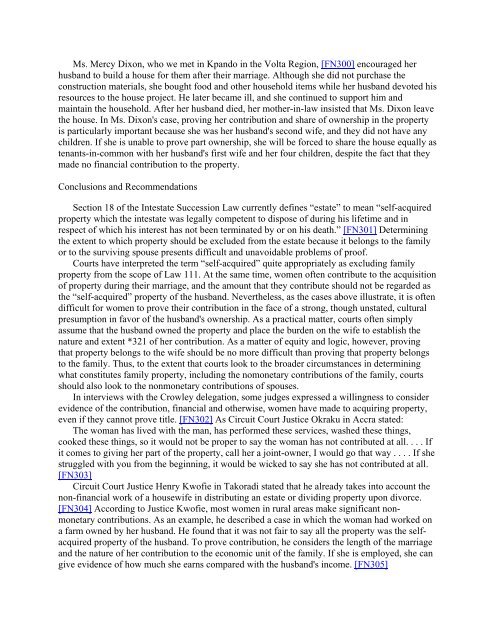Law, Culture and Women's Inheritance Rights in ... - Leitner Center
Law, Culture and Women's Inheritance Rights in ... - Leitner Center
Law, Culture and Women's Inheritance Rights in ... - Leitner Center
You also want an ePaper? Increase the reach of your titles
YUMPU automatically turns print PDFs into web optimized ePapers that Google loves.
Ms. Mercy Dixon, who we met <strong>in</strong> Kp<strong>and</strong>o <strong>in</strong> the Volta Region, [FN300] encouraged her<br />
husb<strong>and</strong> to build a house for them after their marriage. Although she did not purchase the<br />
construction materials, she bought food <strong>and</strong> other household items while her husb<strong>and</strong> devoted his<br />
resources to the house project. He later became ill, <strong>and</strong> she cont<strong>in</strong>ued to support him <strong>and</strong><br />
ma<strong>in</strong>ta<strong>in</strong> the household. After her husb<strong>and</strong> died, her mother-<strong>in</strong>-law <strong>in</strong>sisted that Ms. Dixon leave<br />
the house. In Ms. Dixon's case, prov<strong>in</strong>g her contribution <strong>and</strong> share of ownership <strong>in</strong> the property<br />
is particularly important because she was her husb<strong>and</strong>'s second wife, <strong>and</strong> they did not have any<br />
children. If she is unable to prove part ownership, she will be forced to share the house equally as<br />
tenants-<strong>in</strong>-common with her husb<strong>and</strong>'s first wife <strong>and</strong> her four children, despite the fact that they<br />
made no f<strong>in</strong>ancial contribution to the property.<br />
Conclusions <strong>and</strong> Recommendations<br />
Section 18 of the Intestate Succession <strong>Law</strong> currently def<strong>in</strong>es “estate” to mean “self-acquired<br />
property which the <strong>in</strong>testate was legally competent to dispose of dur<strong>in</strong>g his lifetime <strong>and</strong> <strong>in</strong><br />
respect of which his <strong>in</strong>terest has not been term<strong>in</strong>ated by or on his death.” [FN301] Determ<strong>in</strong><strong>in</strong>g<br />
the extent to which property should be excluded from the estate because it belongs to the family<br />
or to the surviv<strong>in</strong>g spouse presents difficult <strong>and</strong> unavoidable problems of proof.<br />
Courts have <strong>in</strong>terpreted the term “self-acquired” quite appropriately as exclud<strong>in</strong>g family<br />
property from the scope of <strong>Law</strong> 111. At the same time, women often contribute to the acquisition<br />
of property dur<strong>in</strong>g their marriage, <strong>and</strong> the amount that they contribute should not be regarded as<br />
the “self-acquired” property of the husb<strong>and</strong>. Nevertheless, as the cases above illustrate, it is often<br />
difficult for women to prove their contribution <strong>in</strong> the face of a strong, though unstated, cultural<br />
presumption <strong>in</strong> favor of the husb<strong>and</strong>'s ownership. As a practical matter, courts often simply<br />
assume that the husb<strong>and</strong> owned the property <strong>and</strong> place the burden on the wife to establish the<br />
nature <strong>and</strong> extent *321 of her contribution. As a matter of equity <strong>and</strong> logic, however, prov<strong>in</strong>g<br />
that property belongs to the wife should be no more difficult than prov<strong>in</strong>g that property belongs<br />
to the family. Thus, to the extent that courts look to the broader circumstances <strong>in</strong> determ<strong>in</strong><strong>in</strong>g<br />
what constitutes family property, <strong>in</strong>clud<strong>in</strong>g the nomonetary contributions of the family, courts<br />
should also look to the nonmonetary contributions of spouses.<br />
In <strong>in</strong>terviews with the Crowley delegation, some judges expressed a will<strong>in</strong>gness to consider<br />
evidence of the contribution, f<strong>in</strong>ancial <strong>and</strong> otherwise, women have made to acquir<strong>in</strong>g property,<br />
even if they cannot prove title. [FN302] As Circuit Court Justice Okraku <strong>in</strong> Accra stated:<br />
The woman has lived with the man, has performed these services, washed these th<strong>in</strong>gs,<br />
cooked these th<strong>in</strong>gs, so it would not be proper to say the woman has not contributed at all. . . . If<br />
it comes to giv<strong>in</strong>g her part of the property, call her a jo<strong>in</strong>t-owner, I would go that way . . . . If she<br />
struggled with you from the beg<strong>in</strong>n<strong>in</strong>g, it would be wicked to say she has not contributed at all.<br />
[FN303]<br />
Circuit Court Justice Henry Kwofie <strong>in</strong> Takoradi stated that he already takes <strong>in</strong>to account the<br />
non-f<strong>in</strong>ancial work of a housewife <strong>in</strong> distribut<strong>in</strong>g an estate or divid<strong>in</strong>g property upon divorce.<br />
[FN304] Accord<strong>in</strong>g to Justice Kwofie, most women <strong>in</strong> rural areas make significant nonmonetary<br />
contributions. As an example, he described a case <strong>in</strong> which the woman had worked on<br />
a farm owned by her husb<strong>and</strong>. He found that it was not fair to say all the property was the selfacquired<br />
property of the husb<strong>and</strong>. To prove contribution, he considers the length of the marriage<br />
<strong>and</strong> the nature of her contribution to the economic unit of the family. If she is employed, she can<br />
give evidence of how much she earns compared with the husb<strong>and</strong>'s <strong>in</strong>come. [FN305]


